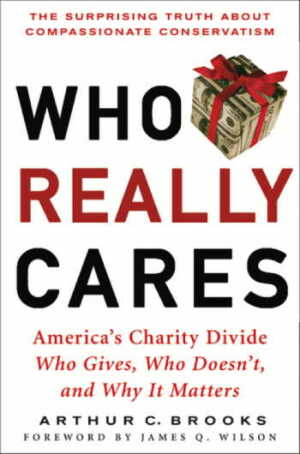Who Really Cares?
The Surprising Truth about Compassionate Conservatism
Arthur C. Brooks
We all know we should give to charity, but who really does? Approximately three quarters of Americans give their time and money to various charities, churches, and causes, the other quarter of the population does not. Why has America split into two nations: givers and non-givers?
Arthur Brooks, a top scholar of economics and public policy, has spent years researching this trend, and even he was surprised by what he found. In Who Really Cares?, he demonstrates that conservatives really are compassionate—far more compassionate than their liberal foes. Strong families, church attendance, earned income (rather than state-subsidized income), and the belief that individuals, not government, offer the best solution to social ills—all are factors that determine how likely one is to give.
Charity matters—not just to the giver and the recipient—but to the nation as a whole. It is crucial to our prosperity, happiness, health, and our ability to govern ourselves as a free people. In Who Really Cares?, Arthur Brooks outlines strategies for expanding the ranks of givers, for the good of all Americans.
Published by Basic Books
Praise for Who Really Cares?
There will of course be many readers (and many more nonreaders) of Mr. Brooks’s book who will dismiss it on its face, and there will be fierce efforts mounted to discredit his analysis and data. Let them come. Who Really Cares should serve to change the public discussion dramatically. With any luck, it will be for our decade what Charles Murray’s Losing Ground was for the 1980s (challenging the disincentive logic of welfare) or what Michael Harrington’s The Other America was for the 1960s (highlighting the persistence of poverty amid affluence)—the text at the center of a constructive national debate.
— Wall Street Journal
The next time you find yourself in a conversation about how liberals are caring and compassionate while conservatives are selfish and hard-hearted, you might want to refer your interlocutors to Who Really Cares.
— First Things
Provocative… It’s not just that charity helps those on the receiving end, says Brooks, an economist at Syracuse University in New York. It also strengthens the cohesion of society at large. Moreover, it appears to make the givers themselves more successful, possibly because the activity transforms them somewhat into better or happier people. Whatever the reasons, he finds that higher income tends to push up charity – and that greater charity tends to push up income.
— Christian Science Monitor
[B]reaks new ground… InWho Really Cares, Arthur C. Brooks finds that religious conservatives are far more charitable than secular liberals, and that those who support the idea that government should redistribute income are among the least likely to dig into their own wallets to help others.
— Chronicle of Philanthropy
